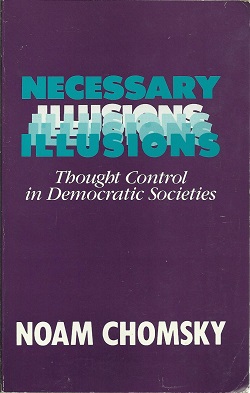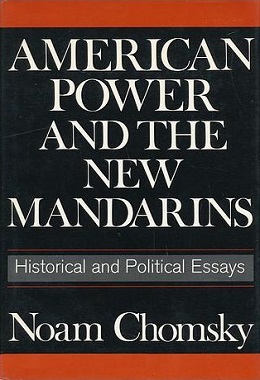Rogue state or outlaw state is a term applied by some international theorists to states they consider threatening to the world's peace. This means being seen to meet certain criteria, such as being ruled by authoritarian or totalitarian governments that severely restrict human rights, sponsoring terrorism and seeking to proliferate weapons of mass destruction. The term is used most by the United States, and in his speech at the United Nations (UN) in 2017, Donald Trump reiterated this phrase. However, it has been applied by other countries as well.

Necessary Illusions: Thought Control in Democratic Societies is a 1989 book by United States academic Noam Chomsky concerning political power using propaganda to distort and distract from major issues to maintain confusion and complicity, preventing real democracy from becoming effective. The title of this book borrows a phrase from the writings of Reinhold Niebuhr.
The international community is a phrase used in geopolitics and international relations to refer to a broad group of people and governments of the world. It does not refer literally to all nations or states in the world. The term is typically used to imply the existence of a common point of view towards such matters as specific issues of human rights. Activists, politicians and commentators often use the term in calling for action to be taken; e.g., action against what is in their opinion political repression in a target country.
The Kirkpatrick Doctrine was the doctrine expounded by United States Ambassador to the United Nations Jeane Kirkpatrick in the early 1980s based on her 1979 essay, "Dictatorships and Double Standards". The doctrine was used to justify the U.S. foreign policy of supporting Third World anti-communist dictatorships during the Cold War.
The propaganda model is a conceptual model in political economy advanced by Edward S. Herman and Noam Chomsky to explain how propaganda and systemic biases function in corporate mass media. The model seeks to explain how populations are manipulated and how consent for economic, social, and political policies is "manufactured" in the public mind due to this propaganda. The theory posits that the way in which corporate media is structured creates an inherent conflict of interest that acts as propaganda for undemocratic forces.

Hegemony or Survival: America's Quest for Global Dominance is a study of the American empire written by the American linguist and political activist Noam Chomsky, a professor at the Massachusetts Institute of Technology. It was first published in the United States in November 2003 by Metropolitan Books and then in the United Kingdom by Penguin Books.
Edward Samuel Herman was an American economist, media scholar and social critic. Often associated with Noam Chomsky, Herman is best known for his media criticism, in particular his propaganda model developed in conjunction with Chomsky. He held an appointment as Professor Emeritus of finance at the Wharton School of Business of the University of Pennsylvania and a media analyst with a specialty in corporate and regulatory issues as well as political economy. He also taught at Annenberg School for Communication at the University of Pennsylvania.
The 9/11 Public Discourse Project was a non-governmental organization with 501(c)(3) nonprofit status, started by the ten members of the 9/11 Commission after the commission disbanded on August 21, 2004. Intended as a public education campaign which focused on making America safer and more aware of existing and potential dangers, the project ceased operations on December 31, 2005.

Deep Shock is a 2003 American science-fiction-horror film that debuted as a Sci Fi Pictures TV-movie on the Sci Fi Channel. Its plot concerns an unknown underwater object that disables an American nuclear-powered submarine and attacks a submerged Arctic research complex.The monsters of the movie are giant intelligent electric eels.

Deterring Democracy is a book published in 1991 by Noam Chomsky, which explores the differences between the humanitarian rhetoric and imperialistic reality of United States foreign policy and how it affects various countries around the world.

Noam Chomsky is an intellectual, political activist, and critic of the foreign policy of the United States and other governments. Noam Chomsky describes himself as a libertarian socialist, a sympathizer of anarcho-syndicalism, and is considered to be a key intellectual figure within the left-wing of politics of the United States.

The Fateful Triangle: The United States, Israel and the Palestinians is a 1983 book by Noam Chomsky about the relationship between the US, Israel and the Arab Palestinians. Chomsky examines the origins of this relationship and its meaningful consequences for the Palestinians and other Arabs. The book mainly concentrates on the 1982 Lebanon War and the "pro-Zionist bias" of most US media and intellectuals, as Chomsky puts it.
"The Responsibility of Intellectuals" is an essay by the American academic Noam Chomsky which was published as a special supplement by The New York Review of Books on 23 February 1967.

American Power and the New Mandarins is a book by the US academic Noam Chomsky, largely written in 1968, published in 1969. It was his first political book and sets out in detail his opposition to the Vietnam War.
Several scholars have accused the United States of conducting state terrorism. They have written about the liberal democracies' use of state terrorism, particularly in relation to the Cold War. According to them, state terrorism is used to protect the interest of capitalist elites, and the U.S. organized a neo-colonial system of client states, co-operating with regional elites to rule through terror. This work has proved controversial with mainstream scholars of both state and non-state terrorism, which is often omitted from their work, along with any mention that Western liberal democracies, as former imperial powers, frequently used terrorism in the invasions and occupations of their colonies.
This is a list of writings published by the American author Noam Chomsky.
The American Empire Project is a book series that deals with what they theorized were imperialist and exceptionalist tendencies in recent US foreign policy. The series is published by Metropolitan Books and includes contributions by notable authors such as Noam Chomsky, Howard Zinn, Chalmers Johnson and Andrew Bacevich.
The project's goal is to provide a critical look at what they called the imperial ambitions of the United States and to explore viable alternatives for foreign policy.

Occupy is a short study of the Occupy movement written by the American academic and political activist Noam Chomsky. Initially published in the United States by the Zuccotti Park Press as the first title in their Occupied Media Pamphlet Series in 2012, it was subsequently republished in the United Kingdom by Penguin Books later that year.
A failed state is a state perceived as having failed at some of the basic conditions and responsibilities of a sovereign government.









